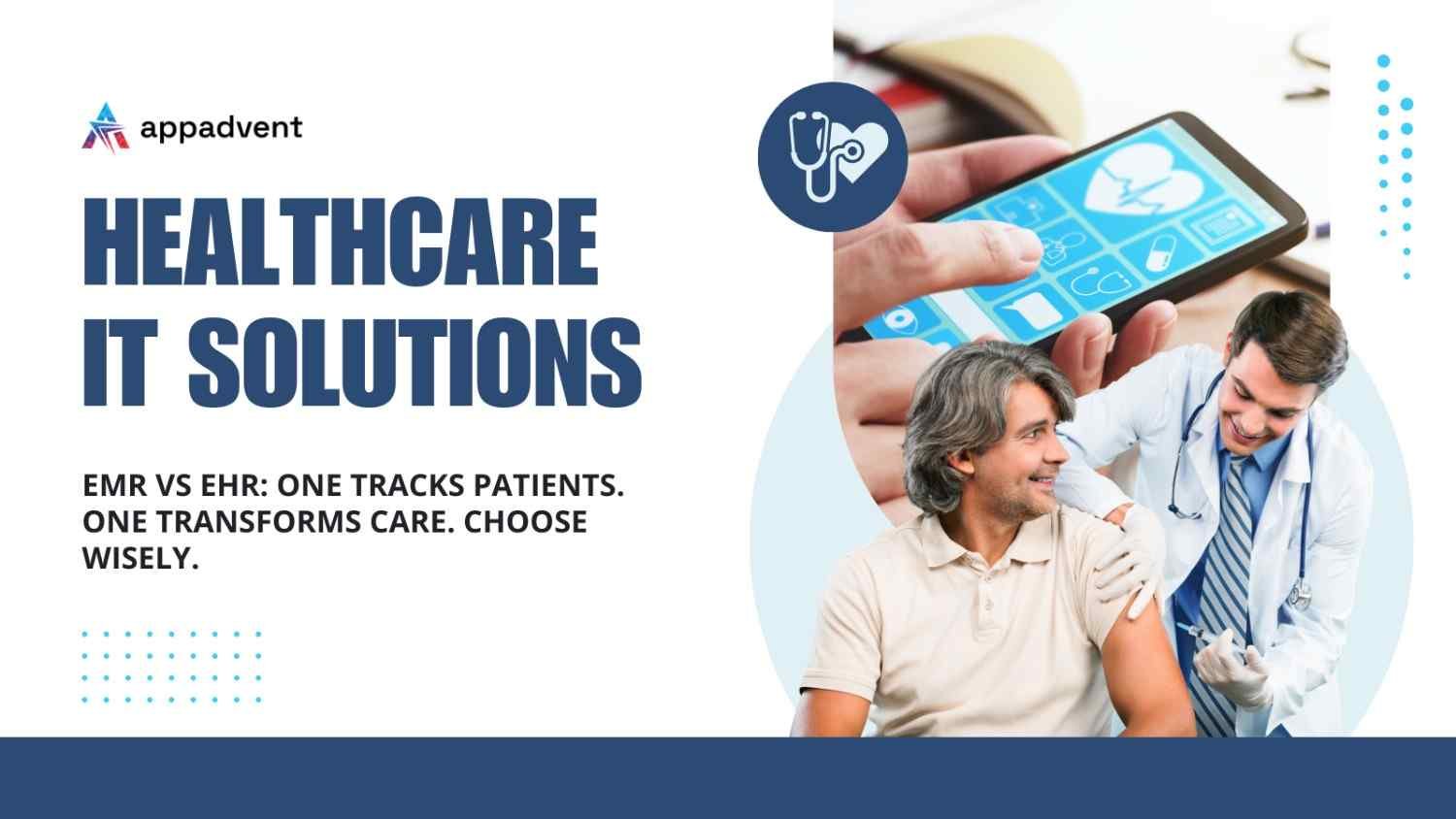
EMR Vs EHR Development: What should you choose for your healthcare business?
The healthcare industry is in the midst of a revolutionary digital transformation. The advent of new and better software systems have made things easier, at the same time, a bit confusing. The questions that ruffle the mind is: what to choose? What is better?
Two examples of digital technologies that promise to revolutionize the healthcare system are: Electronic Medical Records (EMR) and Electronic Health Records (EHR). So, what is the difference between an EMR and an EHR?
Before we go to that, let us tell you that both systems affect regulatory compliance and patient care. They also influence the operations of healthcare enterprises in the data-driven digital age.
Table of Contents
What is the difference between an EMR and an EHR?
The first thing you must know is: EMR and EHR are not the same.
Although people use these terms interchangeably, they cater to different kinds and functions of healthcare enterprises. As a healthcare provider, you must be careful in choosing a system, as the wrong choice can lead to compliance risks, interruptions in your healthcare operations, and system overhauls that can be expensive.
What’s the similarity?
EMR and EHR are both digital record-keeping systems. They assist the healthcare industry in keeping records of the patients and retrieving it when needed. Yet, they are different when it comes to the accessibility, scope, and overall impact on the healthcare operations.
EMR vs EHR
Before we dive deep into the difference between EHR and EMR, let’s understand what they are:
1. Electronic Medical Records (EMR):
EMR is a fine alternative to paper-based medical records where a person had to manually pen down each and every detail of a patient’s health history, medication, current status, and likewise.
EMR stores and manages patient diagnoses, medical history, treatment plans, medications, and health status. This works well for private healthcare practitioners and small healthcare enterprises. The system is not designed to share data between different enterprises and healthcare providers.
2. Electronic Health Records (EHR):
EHR is a comprehensive system that connects multiple healthcare enterprises, providers, and hospitals so that they can access and share the patient’s health records. So, if a patient changes a hospital or a healthcare provider, the new hospital or provider can follow the patient’s health history through EHR system.
EMR vs. EHR systems
The following are the comparisons between the two digitally renowned healthcare software systems. This EMR vs. EHR table will help you understand what to choose for your healthcare enterprise.
| Functionalities | EMR | EHR |
| Primary Function | Patient medical history is only for internal use by single provider | Patient records can be shared across multiple hospitals and providers |
| Data-Sharing | Only internally | Completely interoperable, allowing data sharing externally |
| Compliance | Meets HIPAA standards, but no interoperability | In compliance with 21st Century Cures Act & ONC interoperability criteria |
| Perfect for | Private clinics and small healthcare enterprises | Large scale healthcare networks and big enterprises, chain of hospitals, and multi-location healthcare settings |
| Scope of Integration | Limited | Integrates well with telehealth, analytics, AI, and other advanced technologies |
What to choose?
EMR and EHR don’t simply denote software. They reflect how well technology can align with healthcare regulatory standards, enterprise needs, and scalability of the healthcare service.
So, EMR vs EHR systems isn’t merely about differentiating the software technologies. It is about understanding whether the needs of the healthcare service is met through the system.
Let’s have a closer look at how each system impacts the working of a healthcare setting.
EMR system comparison with EHR system
1. Effect on patient care:
EMRs enhance internal efficiency of a private clinic. The system enables the staff to access patient records quickly. However, a physician from other clinic cannot access this data, if needed.
EHR, on the contrary, lets hospitals, physicians, and labs access the patient data and enable seamless collaboration. This reduces the chance for misdiagnosis, medication errors, and duplicate tests, as a result, paving way for better patient care.
2. Regulatory compliance:
Regulatory standards for healthcare are evolving. There are now stricter mandates for transparency, interoperability, and data access. In such a situation, EMRs lose their competency and EHRs come in handy.
EHR systems are designed to meed the evolving regulatory standards. They comply with:
- HIPAA (Health Insurance Portability and Accountability Act) that mandates patient privacy
- The 21st Century Cures Act that mandates interoperability and the right of a patient to access medical records
- ONC (Office of the National Coordinator for Health Information Technology) that sets standards for interoperability
As per EMR system comparison, EMRs may meet HIPAA standards, but they fail to comply with interoperability.
3. Cost effectiveness:
For smaller healthcare enterprises, cost is a vital factor to consider when installing software systems. As we talk about EMR vs EHR, we realize that EMR systems are usually cheaper and easier to implement than EHR systems. This makes EMRs an preferred choice for small enterprises and private practitioners.
EHRs are costlier than EMRs. Yet, they offer long-term functional efficiencies by alleviating manual paperwork, data entry, and administrative overload. EHRs can be the best choice for big hospitals and large scale healthcare settings, as the system streamlines their operations. For them, EHRs prove to be more cost-effective than EMRs in the long run.
4. Scalability factor:
A small scale healthcare enterprise is bound to expand in the future. In this case, EMR system comparison shows us that this system won’t support a growing enterprise. It is meant only for small scale ones.
So, unless you are a private practitioner who wishes to continue practicing on an individual basis, you must upgrade to EHR system in the future, as your enterprise grows. If you continue with EMR, you might face challenges in data sharing, integration, regulatory compliance, and efficiency of your healthcare system.
EHRs are future-proof. They are designed to seamlessly integrate with AI technologies, telehealth services, remote patient monitoring technologies, and other advanced clinical systems that utilize machine learning to achieve precision in healthcare.
Now that you know the difference between EHR and EMR, it becomes easier to choose between the two. Intepret your present needs and your future requirements. Choose a system accordingly and, when the time comes, upgrade intelligently. Remember, the healthcare industry is rapidly changing. You can’t stay with one set system the whole time.
What we’ve learned is yours for sharing!

App Development Company Case Study: Importance of Software Development Performance Metrics
Read More »Recent Posts
Catagory
Contact Us!











